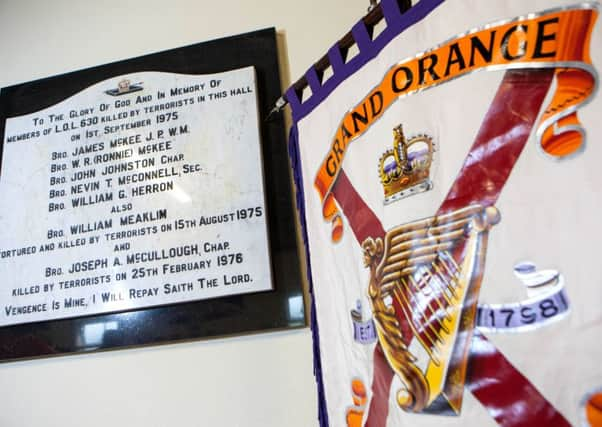Orange Order: New thinking required on legacy


In its formal submission to the Northern Ireland Office, the Grand Lodge underlined the current proposals do not “sufficiently underpin” the principles of balance, proportionality and the truth.
The consultation paper – Addressing the Legacy of Northern Ireland’s Past – was launched in May this year.
Key points of the Institution’s response include:
Advertisement
Hide AdAdvertisement
Hide Ad• There should be a clear and concise definition of the term ‘victim’ which reflects and underpins the fact that terrorist victim-makers cannot be considered equitable to those they killed, maimed or left to grieve.
• There should be no shying away from the fact that what is somewhat benignly referred to as the ‘Troubles’ was in fact a brutal and prolonged campaign of terrorism. Language used when describing the period should not be sanitised.
• Seriously injured victims must be included in any process and should include those physically and mentally traumatised.
• Recognition must be made of the huge additional burden of suffering shouldered by the families of innocent victims who had to witness their loved one’s killers set free under the terms of the 1998 Belfast Agreement. Further frustration and anger exists around the ‘letters of comfort’ issued to dozens of those yet to answer for their actions.
Advertisement
Hide AdAdvertisement
Hide AdOver 330 members of the Order were murdered by terrorists during the Troubles.
Commenting on the proposed structures, the Grand Lodge questioned the remit of the Historical Investigations Unit (HIU) and whether those incidents which maimed and wounded thousands of innocent victims will be investigated.
It added: “Without new evidence which is likely to result in a prosecution, those families who have already had their cases investigated by the Historical Enquiries Team cannot expect any new or further investigation by HIU.
“HIU will continue to disproportionately examine killings attributable to state forces due to the lack of evidence/records available concerning the actions of terrorist groups.”
Advertisement
Hide AdAdvertisement
Hide AdThe Institution also queried the adequacy of an Independent Commission on Information Retrieval (ICIR), referring to the “highly likely lack of engagement” by terrorists.
“Leading republicans have already demonstrated their contempt for ‘truth recovery’ by citing the so-called IRA oath as a reason not to discuss particular subjects,” the submission states.
“Any structure which allows the supply of untested, anonymised information which cannot directly be used in prosecution is entirely at risk of becoming another vehicle to re-write history.”
And the Grand Lodge maintained that an oral history archive would provide republicans with a further opportunity to reinforce their “warped narrative” of state violence and collusion.